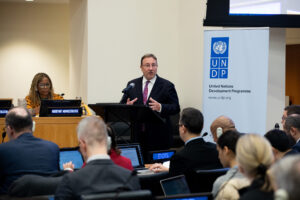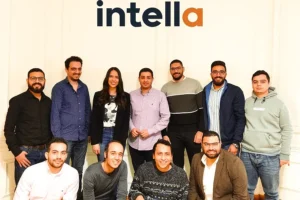THE NEWS: What Happened
An Egyptian artificial intelligence company has secured $12.5m in Series A funding to exploit a linguistic advantage that eludes global technology giants. Intella, founded in 2021 by chief executive Nour Taher and chief technology officer Omar Mansour, has achieved 95.73% transcription accuracy across more than 25 Arabic dialects—a technical benchmark that positions the Cairo-based startup ahead of international competitors in serving the Arabic-speaking world’s 400 million inhabitants.
The oversubscribed funding round was led by Prosus Ventures, with participation from 500 Global, Wa’ed Ventures (Aramco’s venture capital arm), Hala Ventures, Idrisi Ventures, and HearstLab. The investment brings Intella’s total funding to approximately $16.9m since inception, reflecting growing investor recognition that linguistic complexity creates defensible market positions for startups with cultural and technical expertise that global companies cannot easily replicate.
Intella’s business model centres on speech-to-text technology optimised for Arabic dialects, which differ significantly from Modern Standard Arabic taught in schools but predominate in everyday conversation. The company’s solutions serve clients across finance, telecommunications, and government sectors, providing transcript analytics and conversational agents that transform spoken interactions into enterprise intelligence. Revenue more than doubled in 2024, with projections suggesting up to seven-fold growth in 2025 as voice-enabled services gain adoption across Middle Eastern and North African markets.
THE INTELLIGENCE: What It Means
This funding round illuminates a broader trend where linguistic and cultural complexity creates sustainable competitive advantages for regional technology companies. Unlike software categories where global giants can achieve dominance through superior resources and distribution, language-specific applications require deep cultural understanding and linguistic expertise that cannot be easily acquired or replicated by foreign competitors.
The investor composition reveals strategic thinking about Middle Eastern market opportunities. Prosus Ventures’ leadership, combined with Aramco’s venture participation, suggests confidence that Arabic language technology represents a scalable market opportunity rather than a niche application. The presence of both regional investors (Wa’ed, Hala) and international funds (500 Global, HearstLab) indicates recognition that linguistic specialisation can achieve global venture scale while maintaining regional competitive moats.
The technical achievement deserves particular attention. Achieving 95.73% accuracy across 25 Arabic dialects represents significant engineering capability, given that Arabic speech recognition poses challenges that have constrained adoption of voice technologies across MENA markets. This performance level suggests that regional teams with cultural context and linguistic expertise may systematically outperform global technology companies in language-specific applications, creating investment opportunities in underserved linguistic markets.
The revenue trajectory—doubling in 2024 with projections for seven-fold growth in 2025—reflects pent-up demand for Arabic voice technology rather than typical startup growth patterns. This suggests that language-specific AI applications may experience different adoption curves compared to English-dominant technologies, with rapid acceleration once technical thresholds are achieved. The implication for investors is that linguistic specialisation may offer more predictable scaling opportunities than general-purpose AI applications facing intense competition.
The geographic expansion strategy across Egypt and Saudi Arabia demonstrates how regional expertise can address broader market opportunities. Rather than competing globally from inception, Intella is establishing dominance across Arabic-speaking markets before international expansion. This approach may prove more sustainable than startups attempting immediate global scaling without establishing defensible regional positions.
The sector applications—finance, telecommunications, government—indicate that Arabic speech technology addresses enterprise rather than consumer opportunities primarily. This suggests longer sales cycles but higher customer value and retention rates compared to consumer-focused language applications. The enterprise focus also implies regulatory and security requirements that further disadvantage international competitors lacking regional compliance expertise.
THE BRIDGE: What To Do About It
For venture capitalists seeking opportunities in underserved markets, Intella’s funding success highlights investment themes beyond traditional technology centres. The most compelling applications appear to be companies addressing linguistic or cultural complexity that creates natural barriers to competition from dominant global platforms.
Similar opportunities warranting investigation:
- Regional language AI platforms: Companies developing speech and text processing for Hindi, Mandarin dialects, Portuguese variants, or other languages underserved by global technology giants
- Cultural context applications: Startups building AI solutions that require deep understanding of local business practices, regulatory environments, or social dynamics
- Compliance-heavy regional technology: Companies addressing sector-specific requirements in banking, healthcare, or government where local expertise creates competitive advantages over international solutions
Active investors in linguistic specialisation:
- Prosus Ventures: Now demonstrated confidence in regional AI applications, likely seeking similar language-specific technology opportunities across emerging markets
- Aramco Ventures (Wa’ed): Strategic interest in Middle Eastern technology development with particular focus on applications serving regional business requirements
- 500 Global: Established emerging market investor with portfolio including language and cultural technology applications
- Regional sovereign wealth funds: Government investment vehicles increasingly targeting domestic technology capabilities in strategic sectors including artificial intelligence
For founders addressing linguistic or cultural market gaps, Intella’s approach provides strategic guidance about building defensible regional technology businesses. The key insight involves identifying technical challenges where cultural context provides systematic advantages over well-resourced international competitors. Rather than competing on general capabilities, successful companies focus on problems that require deep local understanding and technical expertise.
Market timing appears critical for language-specific applications. Intella’s success reflects growing enterprise demand for voice technology coinciding with sufficient AI infrastructure maturity to address linguistic complexity effectively. Founders should consider whether target markets have reached inflection points where technical capabilities align with commercial demand and regulatory acceptance.
Revenue model selection deserves particular attention for regional technology companies. Enterprise-focused approaches typically provide more predictable scaling opportunities and higher switching costs compared to consumer applications vulnerable to platform changes or competitive copying. The emphasis on government and financial services clients suggests targeting sectors with high compliance requirements and long-term technology relationships.
For corporate development teams at global technology companies, the linguistic specialisation trend presents both competitive threats and partnership opportunities. Rather than attempting to replicate cultural expertise through internal development, established companies may find strategic value in acquiring regional specialists or forming partnerships that combine global infrastructure with local knowledge.
International expansion strategies should consider linguistic and cultural complexity as potential competitive moats rather than market limitations. Companies that establish dominant positions in specific language or cultural markets may achieve more sustainable competitive advantages than startups attempting broad global expansion without differentiated capabilities.
The broader implications extend to any technology category where local expertise creates advantages over global solutions. Sectors including legal technology, regulatory compliance, and cultural content may experience similar dynamics as artificial intelligence applications expand into domains requiring deep contextual understanding rather than general technical capabilities.








